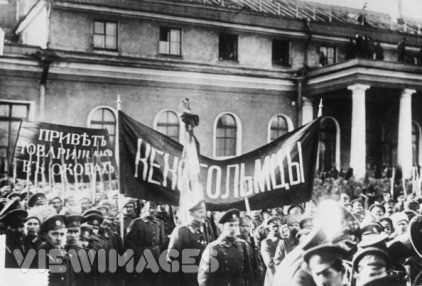The March Revolution
In January 1917, General Krimov, returned from the Eastern Front and sought a meeting with Michael Rodzianko, President of the Duma. During the meeting Krimov told Rodzianko that the officers and the men no longer had faith in Nicholas II and the army was willing to support the Duma if he took control of the government of Russia. Rodzianko declined taking control over the government but did write a letter to the Tsar saying if he didn't take control Russia would reach a breaking point. He also criticised the impact that the Tsar's wife Alexandra Fyodorovna was having on the situation and told him that "you must find a way to remove the Empress from politics."
World War I was really hard on the Russian economy. Food was in short supply and that led to rising prices. In January 1917 the price of commodities in Petrograd had increased six-fold. Industrial workers trying to increase their wages, went on strike and in Petrograd people took over the streets demanding food. On February 11th, 1917 a large crowd marched through the streets breaking shop windows and shouting anti-war slogans.
The situation got worse on February 22nd when the owners of the Putilov Iron Works locked out its workforce after they demanded higher wages. 20,000 workers took the streets and the army was ordered to disperse the demostrations but they were unwilling to do so. In many cases some of the soldier joined the protestors in demanding an end to the war.
Other workers joined the demonstrations and by February 27th an estimated 200,000 workers were on strike. Tsar Nicholas II ordered the commander of the petrograd garrison to suppress "all the disorders on the streets of the capital." The following day troops fired on demonstrators in different parts of the city. Others refused to obey the order and the Pavlovsk's soldiers revolted. Other solder's followed and soldiers joined the striking workers in the streets.
On February 26th, Nicholas II ordered the Duma to close down. Members of the Duma refused. The president of the Duma sent a telegram to the tsar suggesting that he appoint a new government led by someone who had the confidence of the people. When Nicholas did not reply the Duma nominated a Provisional Governtment headed by Prince George Lvov.
On March 15th, tsar Nicholas II gave up his throne. The Romanov dynasty came to its end. The revolution was organized by the lower class. The revolution basically started because they were treated bad. They had no freedom and economically bad.

